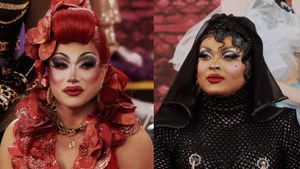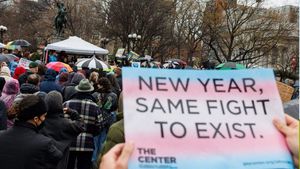Beyoncé lit up the internet with a utopia of black empowerment. Come through Big Freedia, come through natural hair, come through Southern swag, come through black lives, and take your rightful seats on the throne of excellence!
Her new song "Formation" is a reminder that as black people, whether you are male, female, gay, straight, rich, or poor, we are enough. Black is powerful and black is beautiful in all forms. And while this song and video are true examples of black inclusion, there are moments throughout that are speaking specifically to black women.
Beyoncé has gotten our attention. She is standing there in all of her black girl magic and telling the world that her black is beautiful, her daughter’s black is beautiful, and every other black woman, your black is beautiful too. I’m so here for this black power rally, as I’m sure are all black women. But, unfortunately, this message often gets lost in our daily lives, especially in our romantic relationships.
According to the Centers for Disease Control and Prevention (CDC), heterosexual black women account for 64 percent of the new infections amongst women. That means HIV is still a cause for concern in our community. HIV-positive women still need access to treatment and strong support systems. HIV-negative women still need information and support in preventing HIV. The greatest challenges that black women face with HIV are deeply rooted in systemic racism and sexism, and they are not simple or easy to overcome. We must continuously work to gain the strength to recognize that we have the power and ability to protect ourselves from HIV. We are enough; we are empowered.
I often get very annoyed when people discuss HIV transmission and women. Some of the common themes I hear are that men are unfaithful in relationships, and men have previously slept with other men and didn’t tell their female partner. The central idea surrounding those thoughts is that men have unprotected sex and then bring HIV back to their wives or girlfriends. While that may be true, when described in that context, it puts all of the power with the man. It implies that a woman is void of having the responsibility to protect herself or isn’t empowered enough to request protection for herself. Aside from unfortunate situations where women endure various forms of abuse and fear for their safety, we are in control of our bodies and that includes our sexual health.
When discussing sex with partners, many only think about the pleasurable side of things. Kiss here, touch here, I like it rough, be gentle, and so on. Many people, especially women, don’t think to discuss sexual behaviors and past encounters from the perspective of prevention and sexual health.
Before sex occurs a conversation should be had about prevention and getting tested. What type of prevention method, if any, will be used (condoms, female condoms, PrEP, monogamy)? When was the last time either of you were tested? What were the results? Do you want to go get tested together? If your partner is put off by any of these conversations that may be red flag. You want to see me naked, but I can’t inquire about your STI test results. Ask yourself, is this relationship on equal ground? Remember women don’t exist just for the pleasure of men. And this is a concept that has historically been a stereotype for black women.
We have been hyper-sexualized since slavery, when black women were forced to have sex with their white slave owners whenever and wherever. While those days are gone, the damage it created lingers. Just like other forms of institutionalized racism and sexism, these beliefs and stereotypes are still very real and often internalized by society. So remember just because the man you are with is used to having sex without a condom, that doesn’t mean you have to engage in it if you don’t want to. That is a decision that you should make for yourself, and it shouldn’t be influenced by anyone. If not using condoms is something that you want to do then you have every right to get your life doing so. But you also have a responsibility to get tested beforehand, ensure that your partner is tested, and absorb any risk that may come from having unprotected sex.
This is what it means for women to empower themselves and take responsibility and control of their sexual health. Women are constantly told not to rely on a man to take care of them. Well this is no different. Women can’t rely on men to be the only ones to provide the prevention. Society has molded us to believe that the man should dominate everything in a relationship, including decisions about sex.
The man is supposed to carry condoms and always be prepared. This is an important message for both men and women. And do not allow yourself to be slut-shamed for carrying condoms. You want to have sex? Great! just make sure you are prepared. You gain great power in actively protecting yourself, and knowing your HIV status whether it is positive or negative. If you are positive then you can take the steps to ensure that you are healthy and keeping your partners safe. If you are negative then you can take the steps to remain negative. Regardless of HIV status, everyone should take precautions to prevent other sexually transmitted infections. Staying safe is the responsibility of both parties regardless of HIV status or gender.
If you are sexually active then you should be able to talk about sex, take an active role in your protection, and get tested regularly. All aspects of sex should be consensual, safe, and fun. Ladies you can’t control what your man does, but you can control what you do. So listen to Beyoncé and “Get in Formation”. Empower yourself to protect yourself. And if all goes well…take his ass to Red Lobster.








































































